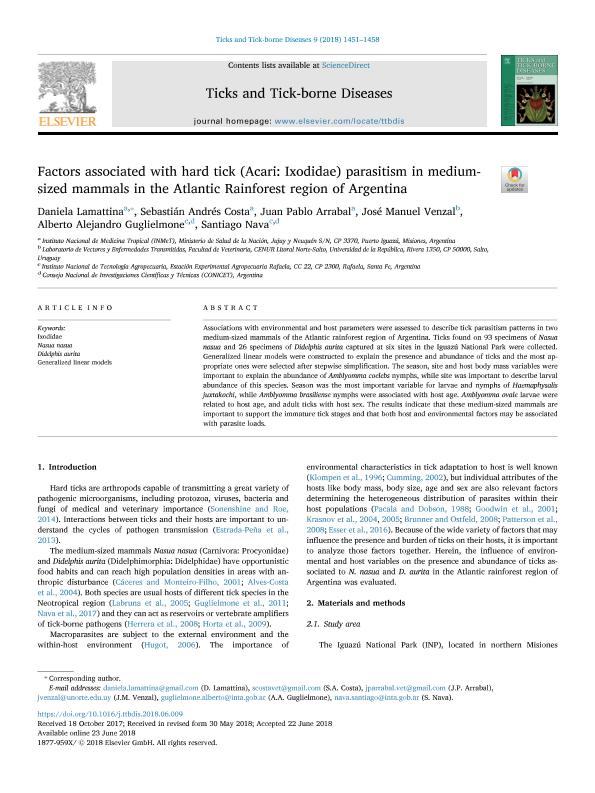Mostrar el registro sencillo del ítem
dc.contributor.author
Lamattina, Daniela

dc.contributor.author
Costa, Sebastián Andrés

dc.contributor.author
Arrabal, Juan Pablo

dc.contributor.author
Venzal, José Manuel
dc.contributor.author
Guglielmone, Alberto Alejandro

dc.contributor.author
Nava, Santiago

dc.date.available
2019-10-01T17:21:39Z
dc.date.issued
2018-09
dc.identifier.citation
Lamattina, Daniela; Costa, Sebastián Andrés; Arrabal, Juan Pablo; Venzal, José Manuel; Guglielmone, Alberto Alejandro; et al.; Factors associated with hard tick (Acari: Ixodidae) parasitism in medium-sized mammals in the Atlantic Rainforest region of Argentina; Elsevier GmbH; Ticks and Tick-borne Diseases; 9; 6; 9-2018; 1451-1458
dc.identifier.issn
1877-959X
dc.identifier.uri
http://hdl.handle.net/11336/84920
dc.description.abstract
Associations with environmental and host parameters were assessed to describe tick parasitism patterns in two medium-sized mammals of the Atlantic rainforest region of Argentina. Ticks found on 93 specimens of Nasua nasua and 26 specimens of Didelphis aurita captured at six sites in the Iguazú National Park were collected. Generalized linear models were constructed to explain the presence and abundance of ticks and the most appropriate ones were selected after stepwise simplification. The season, site and host body mass variables were important to explain the abundance of Amblyomma coelebs nymphs, while site was important to describe larval abundance of this species. Season was the most important variable for larvae and nymphs of Haemaphysalis juxtakochi, while Amblyomma brasiliense nymphs were associated with host age. Amblyomma ovale larvae were related to host age, and adult ticks with host sex. The results indicate that these medium-sized mammals are important to support the immature tick stages and that both host and environmental factors may be associated with parasite loads.
dc.format
application/pdf
dc.language.iso
eng
dc.publisher
Elsevier GmbH
dc.rights
info:eu-repo/semantics/openAccess
dc.rights.uri
https://creativecommons.org/licenses/by-nc-sa/2.5/ar/
dc.subject
DIDELPHIS AURITA
dc.subject
GENERALIZED LINEAR MODELS
dc.subject
IXODIDAE
dc.subject
NASUA NASUA
dc.subject.classification
Otras Ciencias Veterinarias

dc.subject.classification
Ciencias Veterinarias

dc.subject.classification
CIENCIAS AGRÍCOLAS

dc.title
Factors associated with hard tick (Acari: Ixodidae) parasitism in medium-sized mammals in the Atlantic Rainforest region of Argentina
dc.type
info:eu-repo/semantics/article
dc.type
info:ar-repo/semantics/artículo
dc.type
info:eu-repo/semantics/publishedVersion
dc.date.updated
2019-09-27T14:57:31Z
dc.identifier.eissn
1877-9603
dc.journal.volume
9
dc.journal.number
6
dc.journal.pagination
1451-1458
dc.journal.pais
Países Bajos

dc.journal.ciudad
Amsterdam
dc.description.fil
Fil: Lamattina, Daniela. Ministerio de Salud. Instituto Nacional de Medicina Tropical; Argentina
dc.description.fil
Fil: Costa, Sebastián Andrés. Consejo Nacional de Investigaciones Científicas y Técnicas. Centro Científico Tecnológico Conicet - Santa Fe; Argentina. Ministerio de Salud. Instituto Nacional de Medicina Tropical; Argentina
dc.description.fil
Fil: Arrabal, Juan Pablo. Ministerio de Salud. Instituto Nacional de Medicina Tropical; Argentina
dc.description.fil
Fil: Venzal, José Manuel. Universidad de la República; Uruguay
dc.description.fil
Fil: Guglielmone, Alberto Alejandro. Consejo Nacional de Investigaciones Científicas y Técnicas. Centro Científico Tecnológico Conicet - Santa Fe; Argentina. Instituto Nacional de Tecnología Agropecuaria. Centro Regional Santa Fe. Estación Experimental Agropecuaria Rafaela; Argentina
dc.description.fil
Fil: Nava, Santiago. Consejo Nacional de Investigaciones Científicas y Técnicas. Centro Científico Tecnológico Conicet - Santa Fe; Argentina. Instituto Nacional de Tecnología Agropecuaria. Centro Regional Santa Fe. Estación Experimental Agropecuaria Rafaela; Argentina
dc.journal.title
Ticks and Tick-borne Diseases
dc.relation.alternativeid
info:eu-repo/semantics/altIdentifier/doi/http://dx.doi.org/10.1016/j.ttbdis.2018.06.009
dc.relation.alternativeid
info:eu-repo/semantics/altIdentifier/url/https://www.sciencedirect.com/science/article/pii/S1877959X17304727
Archivos asociados
